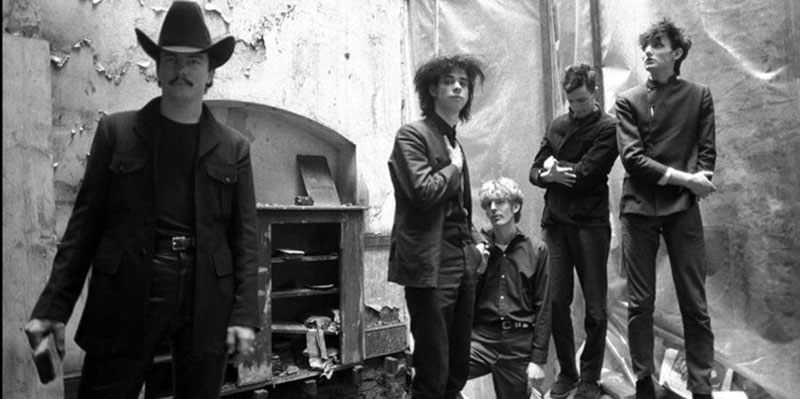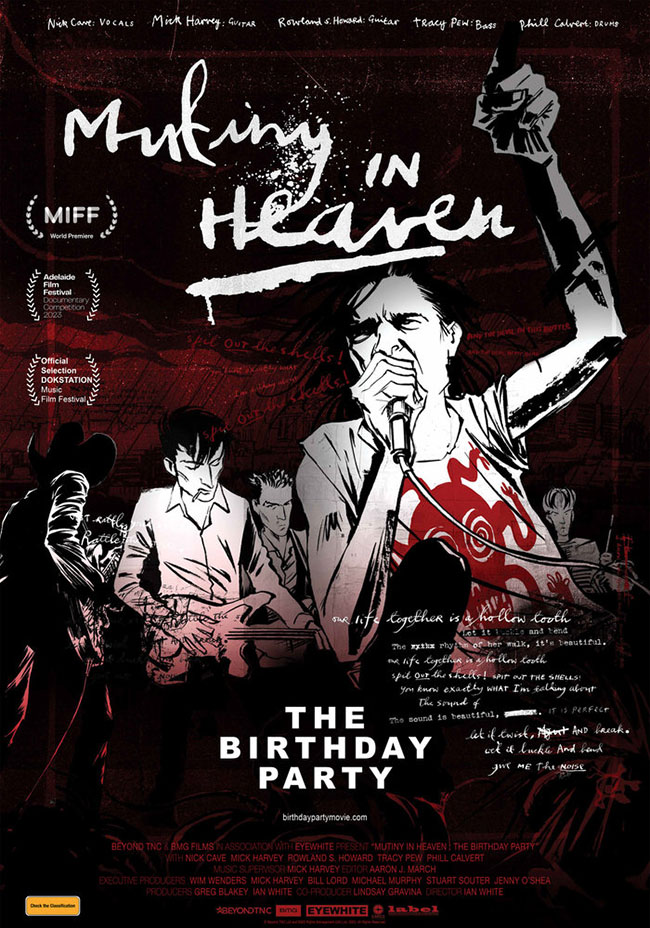
Munity in Heaven: The Birthday Party
Director: Ian White
Rating? Nine skulls and a pair of horns. Read on for an explanation.
Much to my Mum's surprise (yes, I have a mother. I was in fact born), the other day I apologised to her for all the skulls I brought home when I was a disaffected kid, aged nine or whatever, and placed these scabrous ornaments around my bedroom. There was a cat skull, a dog skull, a few lambs and calves, a pig, a snake and blue-tongue, and goat horns (but no goat skull).
The area we lived in was countryside only a decade ago so there was a lot of paddocks nearby. I'd hop the ancient barbed wire fence held taut by termite-eroded chunks of wood, and spend most of the day walking. Saw a lot of stuff I probably shouldn't have. Found out first-hand - long before dissection class at high school - what bodies smelt like when dead and when torn open. Some really unpleasant dirty magazines.
Live snakes, foxes, goats, lizards. Polaroids. Skinned pig's heads. Stolen headstones used as ramps for motorbikes. Got shot at three times - once by a couple of characters who were shooting cans off a stile, who then trained their .22s on us, and the other two times by an irate farmer. I tipped over a lot of rocks, just to see what was underneath. A bad habit which I don't think I've quite grown out of.
I don't think Mum knew about the other stuff I discovered but she raised a hand in protest about the skulls (“there's things living in there!”) and of course, she was right. Rinsing the skulls before I put them in my room hadn't really been on my radar.
Other stuff Mum thankfully didn't know about was bands like The Boys Next Door and The Birthday Party (except when I played them far too loud).
What a difference 40-odd years makes, eh? When I first discovered music in a serious way, I was 12 and for the next ten years it was if floodgates had opened. I followed endless rabbit-tracks, heard innumerable outfits, old and new. As long as it didn't bore me, that was the golden rod to wield.
So I listened and danced to my dad's big band records and reel-to-reel tapes, and at Paul Slater's place, and at many other diverse places, discovered everything in between - Monk's early Blue Note recordings, Franz Schubert, Can, The Victims, The Scientists, The Boys Next Door, early Rolling Stones, Beatles, Love, Trashmen, Cramps ...
Last night, in October 2023, 40 years after The Birthday Party split up, I went to see the first documentary on the band, “Mutiny Heaven” directed by Ian White.
The big takeaway is: if you enjoyed the band at the time, you'll love this. A lot of the footage has either never been seen, or underground. If you weren't out and about back then (you'd pretty much have to be about 58 or older now) and always wondered how on earth Nick Cave got to be so big ... well, The Birthday Party proved to be Nick's trampoline. And that said, despite there being a lot of Nick and Rowland S. Howard in the film ... if you're a fan of their later work there's every chance you won't enjoy the music here...

Which, incidentally, is perfect. Excellent. Because that was ultimately the point of this particular, very unique band. Here. Here it is, here we are. It doesn't matter to us if you like it. Go home. If you do like it, okay. But ... increasingly the band became a huge emotional car-crash on-stage ... until they reappeared in London in early 1982, when the audiences knew what to expect, with the result that football terrace dickheads turned up looking 'for a bit more violence and so on' (to quote Nick in 1982). And the emotional chaos became more peculiar and distorted.
I might add that not every gig they did was extraordinary or magnificent, because each gig represented their inner natures. But the nature of their music alone ... well, I saw them over two nights at their absolute peak and I also saw them the following night when it was simply “too hot to perform” when by comparison, they were flat as your father's mattress but still wiped the floor with every band around.
We all have expectations, you know? Even if we're not aware of it. For example, because I did a lot of research and interviews on the subject, much of which has stayed close to the surface of my DNA, I was initially surprised that White took the decision not to present the band's story strictly chronologically, but to trace themes and concepts: this has the overall impact of a confusing riot of sound and sensation - pretty much like a Birthday Party gig.
Then I realised several other things: first, while White clearly had access to an embarrassment of riches (including what looks like Nick's mum's trove of cuttings and whatnottery), it's quite likely that trying to present the visuals strictly chronologically AND maintain the integrity of the themes ... proved just too damn difficult. So, he's stuck to several clearly-delineated threads, and let them carry the film's narrative.
Nick Cave is the main drawcard, of course, and there's plenty of him. Catering to the modern grunge aficionado, there's a couple of soundbites from a Sonic Youth and someone else (thankfully Rollins and Bono are absent).
Second, there was simply so much going on with this band that some things were never going to appear, because it would make the story soooo long and complicated; they were surrounded by friends and others... Rabbit-hole after rabbit-hole would pop up.
For example, it was by no means inevitable that the band would become popular (much less become famous): a pivotal moment is when Keith Glass found them playing at the Tiger Lounge he got so excited by the band that he became their manager, supported their trips to UK, and put out their records on Missing Link (evading the band's recording contract with Mushroom by simply playing Michael Gudinski a tape of the band's recording, “Hee Haw”, horrifying Gudinski, who probably thought that if Mushroom released it they'd lose money hand over fist).
Keith and his wife Helena sacrificed a lot on the altar of this band, but their story would be a huge distraction (although, hell, it would probably make a TV series on its own). The band had a lot of help from their (unpaid) roadies as well. I guess it would be near-impossible now to do a doc on the wild and scary Nuna boys (pronounced 'Nunna' - they were from Nunawadding) though it would be highly entertaining. Again, perhaps a TV series.
Another example might be, as I understand it, drummer Phill Calvert getting the band's single into the hands of the hugely influential radio disc-jockey John Peel in 1980 - and Peelie liking it enough to not only play it on his show, but invite the band for the first of an eventual four recording sessions. He received untold quantities of records and tapes and only asked a band in if he was interested in them. (
Uh, if you've not heard or John Peel, he was responsible for the widespread popularity of a lot of your favourite bands from the 1980's and '90's. Google him, or take note of just ten outfits who probably wouldn't have found fame without him.
Calvert and Mick Harvey were the mostly sober and straight ones in the band, the organisers, the ones who went out and got jobs while the band were in England, whose perspective was more "adult". Speaking of Mick Harvey, he and, to a lesser extent Phill Calvert, weren't covered a great deal - in a documentary on most bands, that is perhaps understandable. The nature of this band, however, was that all the members were more or less equal, with assorted disturbances (and the occasional fistfight). I would have loved to have seen more about the relationship between Tracy Pew and Phill, because the band had the kind of engine-room that hurls hundreds of tons of ocean liner across a raging Atlantic. Tony Cohen: "The rhythm section was thunderous". (“Half Deaf, Completely Mad”, Black Inc., 2023)
A big star today, back then Nick Cave was more like the captain of a ship whose crew might well mutiny (s'cuse the pun)... and sometimes did. This wasn't a smiley-face outfit. But like I say, Ian White has made a pragmatic commercial decision: Nick and Rowland are the best-known characters from the Birthday Party these days, and Tracy was a larger-than-life man (a couple of years after the band split he was dancing on tables to The Exploding White Mice). White has gone with what is both recognisable and identifiable for the majority of straight film-goers.
“Mutiny In Heaven” is a great documentary in and of itself, and if you enjoy an event-packed, vivid rock'n'roll doc you'll dig this. In the context of the world back then: there were only two performers who'd got sweaty down there with the audience, Iggy Pop and Lux Interior. Nick realised the potential of audience confrontation and interaction in 1980, and by 1981 his reckless plunges into the slimy, excited morass down the front were becoming legendary. Like Johnny Appleseed (or The Ramones), where-ever Nick did this around the world, bands formed...
That The Birthday Party proved to be Australia's most influential international band, and they achieved so much, it is extraordinary to see that by the end of it all they were still pretty much broke. As Mick Harvey said during the Q&A afterwards, quite a few bands supported the Birthday Party, and were huge six months later (while The Birthday Party hit a ceiling) (say, The Cocteau Twins). There were a number of good reasons for this: though I tend to think it was mostly that The Birthday Party were so damned extreme that bigger record company execs - who frequently caught their shows - couldn't really see how the hell to market them.
Perhaps they needed some cheesy synth and a blonde with big shoulder pads?
As the band's personality differences intensified in the pressure cooker, expectations of the crowds - and the band of themselves - slowly shifted the band's internal balance (already rocky and skewiff), their public trajectory also shifted, the expectations of the audience shifted ... and that sent everyone's expectations in new directions.
Mind you, knowing what I do know, which I also know is but a fraction of the whole ... if “Mutiny In Heaven” does as well as it and the band deserves, there remains space for another, differently balanced, doc - or series of docs - further down the track. Hell, their entire story should be a Netflix series, intercut with actual footage ...
I left wanting to hear and see The Birthday Party all over again, remembering the powerful pull and yearn, those huge tidal surges that they set up inside me. Never mind that it was the times and the context ... which of course it was ... if there's another band in my lifetime which comes from the same emotive, intelligent, violent, psychically demonic place as The Birthday Party ... I'd be stunned. And delighted.
And, Mum? I really am so sorry about all those skulls. Only took me 50 years to realise - and apologise.
Robert Brokenmouth is the aurtohor of the 1996b book, "Nick Cave: The Birthday Party and Other Epic Adventures".

